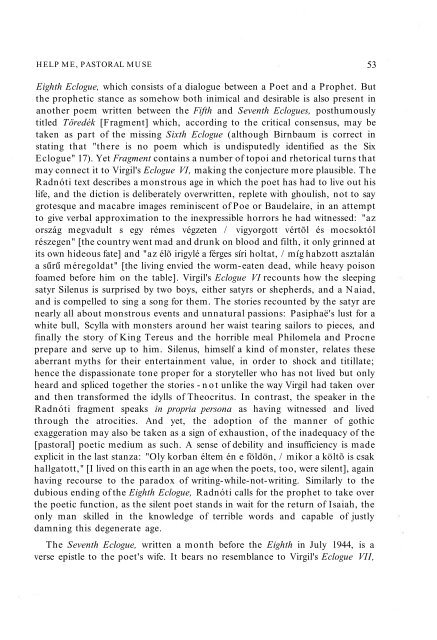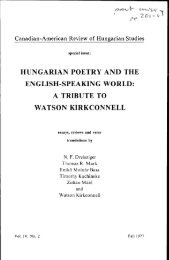52 LÁSZLÓ K. GÉFINthat "if all is in ruins," then the poet should "inscribe [his wrath] on the sky"[az égre írj, ha minden összetört] is overwhelmed by the earlier line, "A fákközött már fuvall a halál" [Death is already blowing through the trees] whichwill reoccur with slight, though all the more powerful alteration in the ThirdRazglednica, one of the last poems Radnóti ever wrote, "Fölöttünk fú aförtelmes halál" [Above us blows the horror of death]. Radnóti's Fourth is thusa deliberate antithesis to Virgil's Eclogue IV; and attempting to write theimpossibility of writing from the vantage point of imminent death, theVirgilian mode is shown up as little more than an idle pastime.There is even more direct connection between Radnóti's Fifth Ecloguewritten in <strong>No</strong>vember 1943, and Virgil's V. Both poems pay tribute to a belovedfigure, now dead. In Virgil the person receives the allegorical name of Daphnis,the protypical bucolic poet, while Radnóti with the dedication "Bálint Györgyemlékére" [In memóriám György Bálint] again appeals to history and thedisappearance in the Ukraine of his close friend, the highly respected essayistand journalist, who, like Radnóti, was also made to serve in a forced laborbatallion. Radnóti's last line, "Mégsem tudok írni ma rólad" [Still, I can'twrite of you today] continues as well the by now obsessive topos of writing theimpossible. Virgil's shepherds in Eclogue V vie with each other in their happytask of deifying Daphnis, who may stand for Caesar, Alfenus Varus, or evenCatullus; in Havas's commentary the choice falls on Daphnis as a personificationof pastoral poetry (85). So in effect Virgil could then be said to be writingthe apotheosis of the kind of poetry he is involved in writing at the time.Despite the surface similarities such as both Daphnis and Bálint having beencut down by a cruel death, and even if the adage "amat bonus otia Daphnis"(61) [good Daphnis loves peace] may be seen to be applicable to both Radnótiand Bálint, the contrast between the two poems is considerable. Eclogue Vends in a perfect resolution of justifying the eminence of pastoral poetry andalso on a note of poetic amity; by contrast, Radnóti's effort is a self-confessedfailure to erect a proper poetic memorial to Bálint. His poem ends up being a"fragment," as indicated by the subtitle he himself affixed to the poem,showing by its disrupted, unfinished shape the disrupted, unfinished life of hisfriend. <strong>No</strong>t only can he not praise pastoral poetry, but the only "bucolic"scenes in the poem are the menacing snow clouds of the approaching winterand the vast steppes of the Ukraine where Bálint and thousands of othervictims lie buried. The kind of rhetorical gesture whereby Virgil's Menalcas isable to exalt Daphnis to the stars ("Daphnim ad astra feremus," 52) isunavailable to a poet in Radnóti's situation.The ending of Eclogue V where Mopsus offers Menalcas his shepherd'scrook as a reward for his superior song will be echoed at the end of Radnóti's
HELP ME, PASTORAL MUSE 53Eighth Eclogue, which consists of a dialogue between a Poet and a Prophet. Butthe prophetic stance as somehow both inimical and desirable is also present inanother poem written between the Fifth and Seventh Eclogues, posthumouslytitled Töredék [Fragment] which, according to the critical consensus, may betaken as part of the missing Sixth Eclogue (although Birnbaum is correct instating that "there is no poem which is undisputedly identified as the SixEclogue" 17). Yet Fragment contains a number of topoi and rhetorical turns thatmay connect it to Virgil's Eclogue VI, making the conjecture more plausible. TheRadnóti text describes a monstrous age in which the poet has had to live out hislife, and the diction is deliberately overwritten, replete with ghoulish, not to saygrotesque and macabre images reminiscent of Poe or Baudelaire, in an attemptto give verbal approximation to the inexpressible horrors he had witnessed: "azország megvadult s egy rémes végzeten / vigyorgott vértől és mocsoktólrészegen" [the country went mad and drunk on blood and filth, it only grinned atits own hideous fate] and "az élő irigylé a férges síri holtat, / míg habzott asztalána sűrű méregoldat" [the living envied the worm-eaten dead, while heavy poisonfoamed before him on the table]. Virgil's Eclogue VI recounts how the sleepingsatyr Silenus is surprised by two boys, either satyrs or shepherds, and a Naiad,and is compelled to sing a song for them. The stories recounted by the satyr arenearly all about monstrous events and unnatural passions: Pasiphaë's lust for awhite bull, Scylla with monsters around her waist tearing sailors to pieces, andfinally the story of King Tereus and the horrible meal Philomela and Procneprepare and serve up to him. Silenus, himself a kind of monster, relates theseaberrant myths for their entertainment value, in order to shock and titillate;hence the dispassionate tone proper for a storyteller who has not lived but onlyheard and spliced together the stories -not unlike the way Virgil had taken overand then transformed the idylls of Theocritus. In contrast, the speaker in theRadnóti fragment speaks in propria persona as having witnessed and livedthrough the atrocities. And yet, the adoption of the manner of gothicexaggeration may also be taken as a sign of exhaustion, of the inadequacy of the[pastoral] poetic medium as such. A sense of debility and insufficiency is madeexplicit in the last stanza: "Oly korban éltem én e földön, / mikor a költő is csakhallgatott," [I lived on this earth in an age when the poets, too, were silent], againhaving recourse to the paradox of writing-while-not-writing. Similarly to thedubious ending of the Eighth Eclogue, Radnóti calls for the prophet to take overthe poetic function, as the silent poet stands in wait for the return of Isaiah, theonly man skilled in the knowledge of terrible words and capable of justlydamning this degenerate age.The Seventh Eclogue, written a month before the Eighth in July 1944, is averse epistle to the poet's wife. It bears no resemblance to Virgil's Eclogue VII,
- Page 1 and 2:
Papers of the Radnóti Memorial Con
- Page 3: HUNGARIAN STUDIESVOLUME 11, 1996 CO
- Page 8 and 9: 6 GEORGE GÖMÖRIprobably Fürst an
- Page 10 and 11: 8 GEORGE GÖMÖRIof the utmost impo
- Page 12 and 13: 10 GEORGE GÖMÖRIén e földön...
- Page 14 and 15: 12 GEORGE GÖMÖRINotes1. Miklós R
- Page 16 and 17: 14 MIHÁLY SZEGEDY-MASZÁKself alwa
- Page 18 and 19: 16 MIHÁLY SZEGEDY-MASZÁKtype is r
- Page 20 and 21: 18 MIHÁLY SZEGEDY-MASZÁKpose, the
- Page 22 and 23: 20 MIHÁLY SZEGEDY-MASZÁK"Wozu Dic
- Page 24 and 25: 22 MIHÁLY SZEGEDY-MASZÁKand Wilme
- Page 26 and 27: 24 MIHÁLY SZEGEDY-MASZÁKbeen the
- Page 28 and 29: 26 MIHÁLY SZEGEDY-MASZÁKBolond, k
- Page 30 and 31: 28 MIHÁLY SZEGEDY-MASZÁK6. Emery
- Page 32 and 33: 30 ZSUZSANNA OZSVÁTHand breaks as
- Page 34 and 35: 32 ZSUZSANNA OZSVÁTHThe drama echo
- Page 36: 34 ZSUZSANNA OZSVÁTHcontinents at
- Page 39 and 40: FROM CAIN TO NAHUM 37which, as Csap
- Page 41 and 42: \FROM CAIN TO NAHUM 39and bears and
- Page 43 and 44: FROM CAIN TO NAHUM 41who sees what
- Page 45 and 46: FROM CAIN TO NAHUM 438. "A félelme
- Page 47 and 48: HELP ME, PASTORAL MUSE:THE VIRGELIA
- Page 49 and 50: HELP ME, PASTORAL MUSE 47compete! W
- Page 51 and 52: HELP ME, PASTORAL MUSE 49of a priva
- Page 53: HELP ME, PASTORAL MUSE 51Once again
- Page 57 and 58: HELP ME, PASTORAL MUSE 55have that
- Page 59: HELP ME, PASTORAL MUSE 57Paul de Ma
- Page 62 and 63: 60 SAMUEL J. WILSONWe did, however,
- Page 64 and 65: 62 SAMUEL J. WILSONbeings and contr
- Page 66 and 67: 64 SAMUEL J. WILSONHungarians would
- Page 68 and 69: 66 SAMUEL J. WILSONthe Austrians. G
- Page 70 and 71: 68 SAMUEL J. WILSONnorth-eastern Zi
- Page 72 and 73: 70 SAMUEL J. WILSONoriginally pursu
- Page 74 and 75: 72 SAMUEL J. WILSONGörgey's decisi
- Page 76 and 77: 74 SAMUEL J. WILSONfrom occurring,
- Page 78 and 79: 76 SAMUEL J. WILSON8. Artúr Görge
- Page 80 and 81: 78 STEVEN TÖTÖSY de ZEPETNEKtört
- Page 82 and 83: 80 STEVEN TÖTÖSY de ZEPETNEKThe c
- Page 84 and 85: 82 STEVEN TÖTÖSY de ZEPETNEKher u
- Page 86 and 87: 84 STEVEN TÖTÖSY de ZEPETNEKthe b
- Page 88 and 89: 86 STEVEN TÖTÖSY de ZEPETNEKrooti
- Page 90 and 91: 88 STEVEN TÖTÖSY de ZEPETNEKcriti
- Page 92 and 93: 90 STEVEN TÖTÖSY de ZEPETNEK'My f
- Page 94 and 95: 92 STEVEN TÖTÖSY de ZEPETNEKshe d
- Page 96 and 97: 94 STEVEN TÖTÖSY de ZEPETNEKNotes
- Page 99 and 100: BERLIN ET PARIS DE LAJOS TIHANYIVAL
- Page 101 and 102: BERLIN ET PARIS DE LAJOS TIHANYI 99
- Page 103 and 104: BERLIN ET PARIS DE LAJOS TIHANYI 10
- Page 105 and 106:
BERLIN ET PARIS DE LAJOS TIHANYI 10
- Page 107 and 108:
BERLIN ET PARIS DE LAJOS TIHANYI 10
- Page 109 and 110:
BERLIN ET PARIS DE LAJOS TIHANYI 10
- Page 111 and 112:
BERLIN ET PARIS DE LAJOS TIHANYI 10
- Page 113 and 114:
BERLIN ET PARIS DE LAJOS TIHANYI 11
- Page 115:
BERLIN ET PARIS DE LAJOS TIHANYI 11
- Page 118 and 119:
116 KEVIN E. KELLYfilms Lugosi made
- Page 120 and 121:
118 KEVIN E. KELLYthe provinces, no
- Page 122 and 123:
120 KEVIN E. KELLYWith his brief an
- Page 124 and 125:
122 KEVIN E. KELLYboth his and Dean
- Page 126 and 127:
124 KEVIN E. KELLYfollowed it into
- Page 128 and 129:
126 KEVIN E. KELLYvampiric nobleman
- Page 130 and 131:
128 KEVIN E. KELLYThe film also boo
- Page 132 and 133:
130 KEVIN E. KELLYWood remained one
- Page 134 and 135:
132 KEVIN E. KELLYLugosi, convinced
- Page 136 and 137:
134 KEVIN E. KELLY19. Lennig, 112-1
- Page 139 and 140:
THE AGON OF IRONY AND SATIREIN GYÖ
- Page 141 and 142:
THE AGON OF IRONY AND SATIRE 139poe
- Page 143 and 144:
THE AGON OF IRONY AND SATIRE 141tra
- Page 145 and 146:
THE AGON OF IRONY AND SATIRE 143fek
- Page 147 and 148:
THE AGON OF IRONY AND SATIRE 145ner
- Page 149 and 150:
THE AGON OF IRONY AND SATIRE 147whi
- Page 151 and 152:
THE AGON OF IRONY AND SATIRE 149mov
- Page 153 and 154:
THE AGON OF IRONY AND SATIRE 151for
- Page 155 and 156:
THE AGON OF IRONY AND SATIREA harma
- Page 157 and 158:
MURDER IN THE MOUNTAINSTranslated b
- Page 159 and 160:
MURDER IN THE MOUNTAINS 157"Afraid?
- Page 161 and 162:
MURDER IN THE MOUNTAINS 159Abády,
- Page 163 and 164:
MURDER IN THE MOUNTAINS 161"The mar
- Page 165 and 166:
MURDER IN THE MOUNTAINS 163Bálint
- Page 167 and 168:
MURDER IN THE MOUNTAINS 165"That is
- Page 169 and 170:
MURDER IN THE MOUNTAINS 167at hand,
- Page 171 and 172:
CONTRIBUTORSMiklós BÁNFFYLászló
















